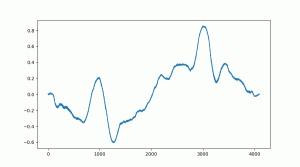This thesis investigates the application of a generative adversarial network (GAN) in the generation process of single-cycle wavetables, which can be played back via a proposed oscillator-framework. Classical wavetable synthesis approaches which allow the user to create wavetbales from their own sounds often lack an automatic processing step to properly align successive wavetables. When interpolating between two adjacent tables phase cancellation can occur which results in sound artifacts during playback.
The goal of the developed TableGAN architecture which is based on both, WaveGAN[1] and DCGAN[2], is to generate a stack of wavetables which represent interpolations between two given points whithin the learnt latent space of the network. The resulting wavetables show high correlations between their predecessors which results in smooth interpolations without artifacts. The following GIF and audio file both show an exemplary interpolation:
Contributions
- A classical wavetable-synthesis framework for extracting wavetables from audio files
- An AI based wavetable-synthesis framework for interpolating the latent space of a trained TableGAN model
- A wavetable-oscillator framework for playback and automation of the wavetable-position
Downloads
Source Code:
Thesis:
Literature
Author
Niklas Wantrupp 2019

